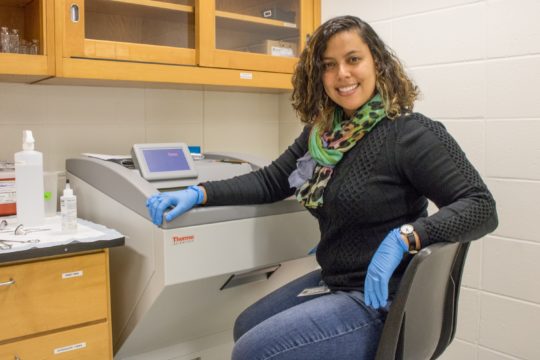The assumption that there is a universal and singular experience as a womxn erases the nuances and variety that exists. This column seeks to address the many intersections that may overlap in an individual’s life. All this is done in an effort to celebrate the reality of womxnhood in the various ways it may be expressed.

Photo by Larissa Davis.
When she was twelve, Assistant Professor of Psychology and Codirector of the Behavioral Neuroscience Laboratory Dr. Linnet Ramos’ father sat her down and they both took a personality test. “We determined I was a very, very heavy Type-A personality,” Ramos recalled happily. In the end, the test helpfully suggested some potential careers in medicine, dentistry and higher academia. Ramos felt something within her resonate. A path in education was solidifying for her, something that she had only seen her father complete within her Puerto Rican family.
Her father only increased his support, working multiple jobs to fund his daughter’s higher education. He was determined to see her succeed, not only in life, but also in a career that would genuinely sustain, inspire and excite her. Her particular interest in the sciences was affirmed later when her grandmother was diagnosed with Alzheimer’s. Within her family, the disease was known only as “Old-Timer’s” until that seemed like the official name of the diagnosis. Fruitless Google searches for the phrase only increased her curiosity — she wanted to understand exactly what it was. Her eventual concentration in the study of addiction formalized as she began her Ph.D. and watched a family relative grapple with its effects. At that point, she wanted to do whatever she could to help.
After graduation, Ramos worked in labs and clinics before she found her niche in teaching. It suited her personality. “I have a responsibility and a role that was assigned to me here at Lawrence,” she said, “But, because I am Hispanic, I have also had students ask me, ‘What is it like to be a brown professor?’” She had never been referred to as such, but she that knows by virtue of her ethnicity and gender, many students of all backgrounds are eager to hear her experiences in STEM. To her surprise, she has become a role model. She shoulders the responsibility that comes with that role with diligence, saying, “I am incredibly passionate about being the best person and mentor I can be so I can be there for the next generation.”
Ramos understands the search for relatability and honesty in these mentoring interactions. She does not always enjoy being frank, especially at the cost of discouraging her students. But, she refuses to leave them unprepared for the reality: it can be difficult to be a person of color in STEM, it can be difficult to be a woman in STEM, it can be difficult when those identities coalesce and the feeling of not belonging persists.
When attending conferences and symposiums, however, Ramos notes the increased presence of other Boricuas like herself at the events. Many of these events are now held specifically to create a community for scientists of color so they can network with each other and be reminded that what seems impossible — whether it be because of gender, race or ethnicity — can be achieved.
Nevertheless, the positivity produced from such gatherings does not always mask some visible shortcomings. At one particular conference, Ramos was asked to speak about her experience as a primary investigator and associate professor of psychology. “I think I was one of six womxn in the room out of 80 people,” she said. “That is not a lot, but it was really important for young womxn in the field to see me in an established position and realize they can do it too.”
The inspiration that Ramos provides as an established figure in the field is only matched by the sense of belonging given to her by the community. “While I was speaking to some diverse fellows, I felt like I fit in for the very first time,” she said. “They knew what Imposter Syndrome was, how it felt in a white community and in their communities. They knew the anxiety of going back home. It felt like I found my people.”
Since moving from Puerto Rico at the age of nine to a primarily white suburb in Connecticut and entering the STEM field, the feeling of isolation has become familiar to Ramos. Throughout her life, she navigated those spheres and cultures without examples to look to. According to her, this experience has “indefinitely shaped her” and created a person defined “by compassion, empathy, and assertiveness.”
But, she is ready for change. Inspired by other outreach programs and diversity fellowships, Ramos hopes to eventually create a foundation that creates spaces for diverse candidates in major institutions. “I want to give them the stuff that I did not have,” she said. “I want them to have mentors they can relate to and be sent to conferences and workshops. I just think it is so important.”
